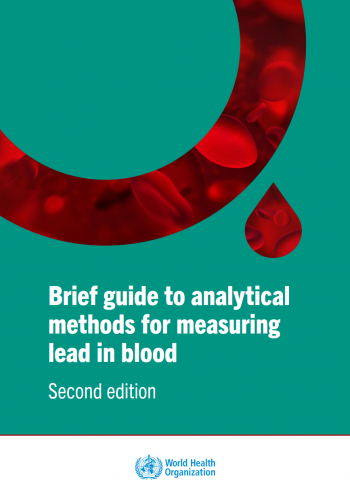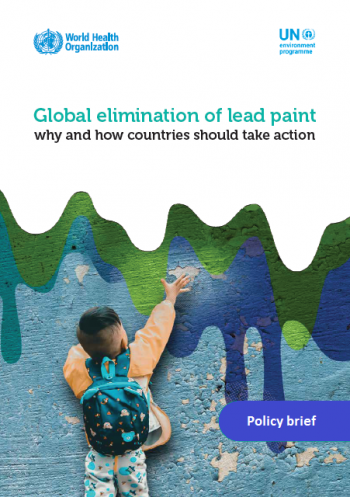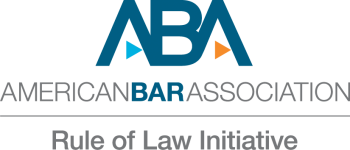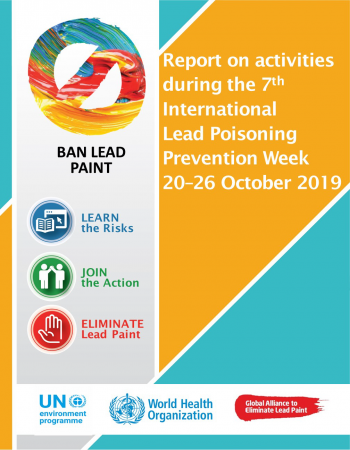Library
Recently Added
-
Prevention Week Pushes Global Phase Out of Lead Paint
Read More
-
Gender and sound management of chemicals and waste: Gender and the SAICM Emerging Policy Issues
The Secretariat of the Strategic Approach to Chemicals Management (SAICM) and the University of Cape Town (UCT) have launched a Community of Practice (CoP) on Chemicals and SDGs to bring representatives from different sectors together and to create a learning network around issues related to addressing Chemicals and the Sustainable Development Goals (SDGs). This is a summary of the discussion on Gender and sound management of chemicals and waste: Gender and the SAICM Emerging Policy Issues, which took place on 26 August 2020. Read More -
Setting low limits for lead in paint – legal side
The Secretariat of the Strategic Approach to Chemicals Management (SAICM) and the University of Cape Town (UCT) are launching a new Community of Practice (CoP) on Lead in Paint to bring representatives from different sectors together and to create a learning network around issues related to the elimination of Lead Paint. This is a summary of the discussion on Setting low limits for lead in paint – legal side, which took place on 18 August 2020. Read More -
Steps toward adoption of national lead paint laws
Angela BandemehrThe Secretariat of the Strategic Approach to Chemicals Management (SAICM) and the University of Cape Town (UCT) are launching a new Community of Practice (CoP) on Lead in Paint to bring representatives from different sectors together and to create a learning network around issues related to the elimination of Lead Paint. This is a summary of the discussion on Steps toward adoption of national lead paint laws, which took place on 9 July 2020. Read More -
Perspectives on addressing HHPs in the SAICM context
The SAICM Secretariat, in partnership with the University of Cape Town, established a community of practice on Highly Hazardous Pesticides (HHPs) to foster discussions, exchange of best practices, and recommendations to address HHPs amongst relevant stakeholders. This is a summary of the discussion on Perspectives on addressing HHPs in the SAICM context, which took place on 19 August 2020. Read More -
Mapping the global landscape of HHP risk reduction work
The SAICM Secretariat, in partnership with the University of Cape Town, established a community of practice on Highly Hazardous Pesticides (HHPs... Read More
-
Role of economic instruments for the sound management of chemicals and waste
“The vast majority of human health costs linked to chemicals production, consumption, and disposal are not borne by chemicals producers, nor... Read More
-
Community of Practice Discusses Adoption of Limits, Laws on Lead in Paint
Read More
-
Agroecology – a viable option to phase out highly hazardous pesticides in Ethiopia
Progressive ban of the use of highly hazardous pesticideshas been recommended by the Food and Agriculture Organisation since 2006 due to the confirmed adverse impacts they can cause. This short booklet reveals the level of HHPs use in Ethiopia; the human health, environmental and economic impacts of using HHPs; the availability of tested alternatives to HHPs; and it recommends the progressive phase out of HHPs from Ethiopia. Read More -
Rotterdam Convention Committee Recommends Informed Consent Procedure for Trade in Two Chemicals
-
Brief guide to analytical methods for measuring lead in blood (Second edition)
Lead is a toxic metal whose widespread use has caused extensive environmental contamination and health problems in many parts of the world.... Read More -
Gender mainstreaming in chemicals and waste policies
New Fact Sheet: Gender mainstreaming in chemicals and waste policies
Gender equality is a core human rights and development issue, as... Read More
-
Working Group Pushes Forward on Guidelines for Plastics, POPs, Incineration
Read More
-
Community of Practice Addresses Links Between Gender and Chemicals
-
Global Observatory Tracks Lead Paint Legislation, Health-related SDG Targets
-
Infographics on Highly Hazardous Pesticides
It's time to regulate Highly Hazardous Pesticides!
It won’t compromise agriculture, but it will save lives.
This document was... Read More
-
Global elimination of lead paint: why and how countries should take action - Policy brief
Lead has toxic effects on almost all body systems and is especially harmful for children and pregnant women. Lead paint is an avoidable source... Read More
-
Global elimination of lead paint: why and how countries should take action - Technical brief
This document has been developed for officials in government who have a role in regulating lead paint, to provide them with concise technical... Read More
-
Colombia Limits Lead Paint in Children’s Items
-
Experts Emphasize Private Sector's Role in Combating Marine Litter
-
Study of the Paint Market in Colombia (Draft / Spanish only)
Las pinturas se han convertido en parte esencial del estilo de vida de la sociedad moderna, el color de ellas es apetecido por sus funciones... Read More
-
Suggested Considerations for Legal Drafting Process (Draft)
In response to questions received by the Global Lead Paint Alliance (GLPA) on roadmaps for developing regulations on lead content in paint, the... Read More
-
Report of the 2019 International Lead poisoning Prevention Week
From 20 to 26 October 2019 the seventh International Lead Poisoning Prevention Week of action (ILPPW) took place in countries around the world.... Read More
-
The Toxic Truth
A new report from UNICEF and Pure Earth reveals that lead poisoning is affecting children on a massive and previously unknown scale. Nearly half of these children live in South Asia. UNICEF and Pure Earth call for urgent action to abolish dangerous practices including the informal recycling of lead acid batteries, which is a leading source of childhood lead exposure. Read More -
eChemPortal: The Global Portal to Information on Chemical Substances
- ‹ previous
- 2 of 10
- next ›




















